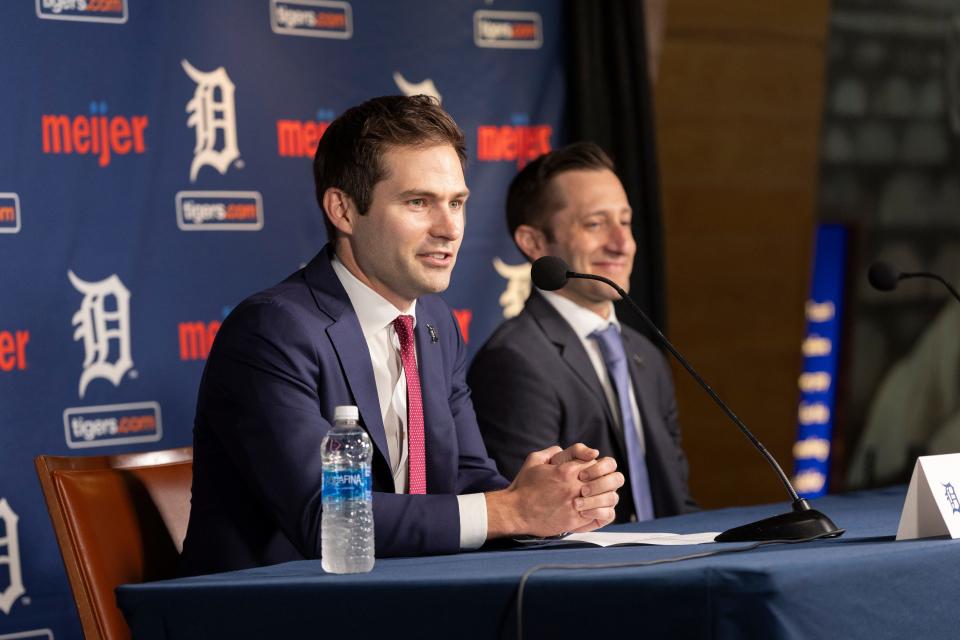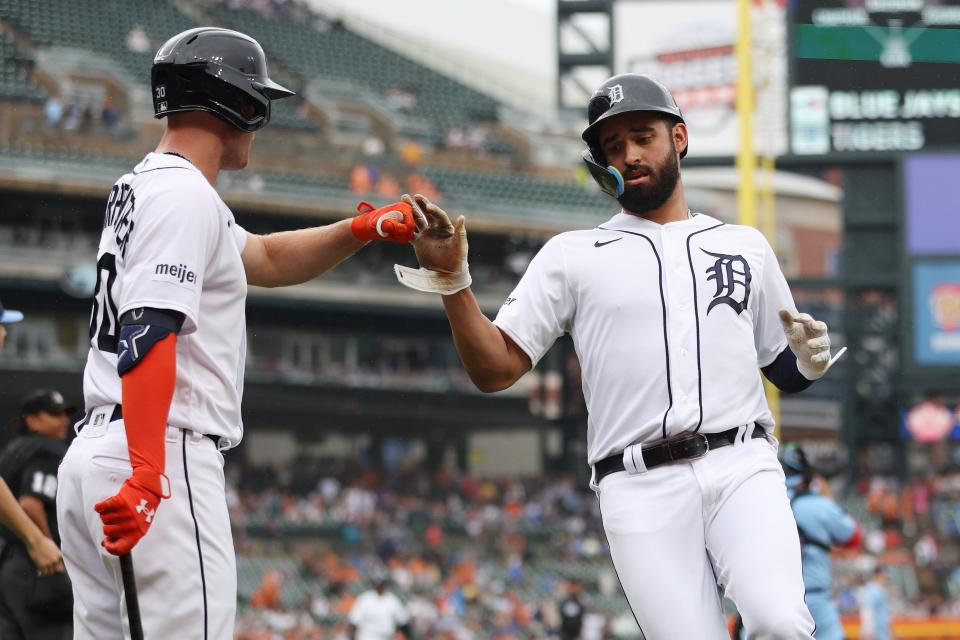Detroit Tigers' Scott Harris answers questions about offseason: Will the team spend big?
Scott Harris feels excited about the future.
Harris, the president of baseball operations, just completed his first full season as the leader of the Detroit Tigers. There were positives and negatives, successes and failures, not enough wins and too many losses. A low payroll, though, isn't the top reason for his enthusiasm.
"When I wake up in the morning, the reason why I'm really excited about this organization is we have young talent coming," Harris said Monday in the Tiger Club at Comerica Park. "We have young talent that's already in the big leagues, and we have more young talent coming."
IN THE BOOTH: Matt Shepard won't return as Tigers play-by-play broadcaster on Bally Sports Detroit

The Tigers finished 78-84 for second place in the American League Central with a team anchored by several younger players: right fielder Kerry Carpenter, left fielder Riley Greene, first baseman Spencer Torkelson, center fielder Parker Meadows, left-hander Tarik Skubal and right-hander Reese Olson.
Those six players, especially the four position players, will be important to remember throughout the offseason. There are a few upper-level prospects to keep in mind, as well: third/second baseman Colt Keith, right/left fielder Justyn-Henry Malloy and second/third baseman Jace Jung. (Don't forget about two older players, either: catcher Jake Rogers and shortstop Javier Báez.)
Why do the nine positions players — Carpenter (RF), Greene (LF), Torkelson (1B), Meadows (CF), Keith (3B/2B), Malloy (RF/LF), Jung (2B/3B), Rogers (C) and Báez (SS) — have an impact on the Tigers' offseason plan?
Let Harris explain: "I'm really bullish on this young talent, so anything we do this offseason — in free agency or trade — we're going to have to be mindful of walking the line between finding outside additions that can help us without blocking some of the young talent that may prove to be the best solutions we can find at certain positions."
The Tigers will be active on the free-agent and trade markets in the offseason, beginning after the World Series.
The big question: How active in free agency?
Considering Harris' comments, the Tigers probably won't be in the expensive sweepstakes for third baseman Matt Chapman, simply because Keith or Jung could be the everyday third baseman. Keith seems likely to make the 2024 Opening Day roster, while Jung should start in Triple-A Toledo.
"I think it's important to remind ourselves there aren't shortcuts to contention," Harris said. "When I think about what we're doing in this organization, we can spend to complement a core, but we can't spend to build a core. That's not a viable strategy in this market."
TAKEAWAYS: Contract decisions at forefront of Tigers chat with Scott Harris, A.J. Hinch

Miguel Cabrera (and his $32 million contract) is not on the payroll anymore, so the designated hitter spot in the lineup is wide open and there is money to spend.
The Tigers intend to keep the DH spot open as a revolving door for several players, though so don't expect them to sign a DH-only slugger such as ex-Tiger J.D. Martinez.
As for payroll, the Tigers won't be paying Cabrera and probably won't be paying left-hander Eduardo Rodriguez. Cabrera cuts $32 million from the projected payroll, and Rodriguez — as long as he exercises the opt-out clause in his contract — would cut an additional $18 million.
That's a total of $50 million off the books, in addition to the eight-figure one year-deals the team handed out to Matthew Boyd and Michael Lorenzen last offseason. The Tigers opened this season with a payroll of $122,235,500,
"We are going to walk the line of being active in free agency and trade to find outside additions that can help us without blocking our young players," Harris said. "What that means in terms of what our total payroll number is, I don't know yet."
The free-agent market for position players is terribly thin. The Tigers should be more active, specifically from a position-player standpoint, on the trade market compared to the free-agent market.
In his first year, Harris made three noteworthy trades to acquire controllable positions players. He traded reliever Joe Jiménez to the Atlanta Braves for Malloy and reliever Gregory Soto and utility player Kody Clemens to the Philadelphia Phillies for outfielder Matt Vierling, infielder Nick Maton and catcher Donny Sands. After the offseason moves, he shipped Lorenzen to the Phillies for infielder Hao-Yu Lee at the trade deadline.

"The trade market is very difficult to forecast because you don't know what the other 29 teams are doing," Harris said, "but right now, this month is going to be important for us to position ourselves to identify opportunities to get better via trade and make sure that we're prepared to press the button when we see something that we like."
The AL Central is the weakest division. Only one team in the AL Central — the Minnesota Twins — posted a winning record this season in finishing nine games ahead of the Tigers. There were three winning teams in each of the other five divisions.
The weak Central means the Tigers, even without external position-player upgrades, have an opportunity to win the division in the 2024 season, but only if young players like Keith, Malloy and Jung produce at the highest level.
"Our core isn't finished," Harris said.
Contact Evan Petzold at epetzold@freepress.com or follow him @EvanPetzold.
Listen to our weekly Tigers show "Days of Roar" every Monday afternoon on demand at freep.com, Apple Podcasts, Spotify or wherever you listen to podcasts. And catch all of our podcasts and daily voice briefing at freep.com/podcasts.
This article originally appeared on Detroit Free Press: Detroit Tigers' Scott Harris answers questions about offseason plans
